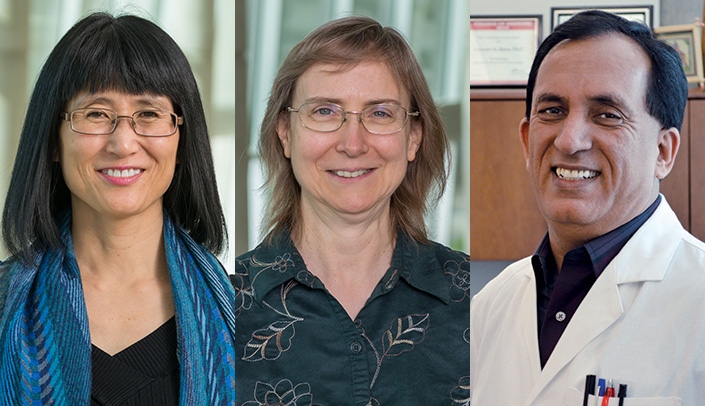Leadership changes at the Fred & Pamela Buffett Cancer Center, as well as changes and reorganization in the cancer center’s research programs, are outlined below.
Surinder Batra, PhD, Stokes-Shackelford Professor and chair of the UNMC Department of Biochemistry and Molecular Biology, has been named the associate director for translational research in the cancer center. In the role, he will oversee the growth of collaborations between clinicians and laboratory scientists to form active translational research teams, moving discoveries from the bench to bedside.
Joyce Solheim, PhD, professor and director of the Cancer Research Doctoral Program at the Eppley Institute, has been appointed associate director for training and education. Dr. Solheim has expertise in graduate education, diversity initiatives and translational cancer research training. She is responsible for advising cancer center trainees and faculty on educational opportunities befitting their positions and research interests.
Shinobu Watanabe-Galloway, PhD, professor and vice chair in the UNMC Department of Epidemiology in the College of Public Health, has been appointed associate director for community outreach and engagement. In this role, she will work with Nicole Carritt, director of UNMC Rural Health Initiatives, to reduce the cancer burden and cancer health disparities across the state through research, improve access to clinical trials and engage Nebraskans in cancer prevention and control activities.
In preparation for the renewal of the Cancer Center Support Grant (CCSG), senior leadership of the cancer center changed the names of two of its three scientific programs to reflect revised missions, themes and reorganized memberships.
- The Cancer Biology Program (CBP), previously Molecular and Biochemical Etiology, is focused on understanding the mechanisms that underlie cancer initiation and progression.
- The Targets, Modulators and Delivery Program (TMDP), previously Cancer Genes and Molecular Regulation, validates cancer targets, develops small molecules to modulate them, and designs efficient methods for drug delivery to tumor cells.
- The GI Cancer Program (GICP) studies the pathogenesis of pancreatic and colorectal cancers, and identifies diagnostic/prognostic biomarkers and novel therapeutic options for these diseases.
New co-leaders also were appointed to each program to provide complementary expertise and foster inter- and intra-programmatic research collaborations.
Chi Lin, MD, professor of radiation oncology, was named a co-leader in the GICP. Jennifer Black, PhD, professor in the Eppley Institute, remains co-leader in the GICP, as well. Dr. Lin’s clinical and research interests include gastrointestinal, lung and pediatric cancers, and designing and developing clinical trials that will expedite improved cancer therapies for patient care.
Sarah Holstein, MD, PhD, associate professor in the UNMC Division of Oncology and Hematology, and Amar Natarajan, PhD, professor in the Eppley Institute, were appointed co-leaders of TMDP. Robert Lewis, PhD, professor in the Eppley Institute, also remains co-leader of this program. Dr. Holstein brings experience in clinical, translational and basic science research with an emphasis on development of novel therapeutic agents, while Dr. Natarajan has extensive experience as a medicinal chemist/chemical biologist.
Pankaj Singh, PhD, professor in the Eppley Institute, was appointed co-leader of CBP. Hamid Band, MD, PhD, professor in the Eppley Institute, remains co-leader of the program. Dr. Singh’s research interests focus on metabolic regulations that support tumor growth and survival, encourage metastasis and impart resistance to chemotherapies.
“Each of these individuals, associate director and co-leaders, brings remarkable strengths to these positions and provides excellent leadership and expertise in these areas,” said Kenneth Cowan, MD, PhD, director and physician-in-chief of the Fred & Pamela Buffett Cancer Center. “Leadership plays a critical role overseeing research, education and community outreach for the cancer center. These leaders are especially important during this critical time as we worked together on the CCSG renewal process with the National Cancer Institute.”

Congratulations to this exceptional group of scientists! The Child Health Research Institute looks forward to many future collaborations.
Congratulations to all the selected faculty for this new assignment.